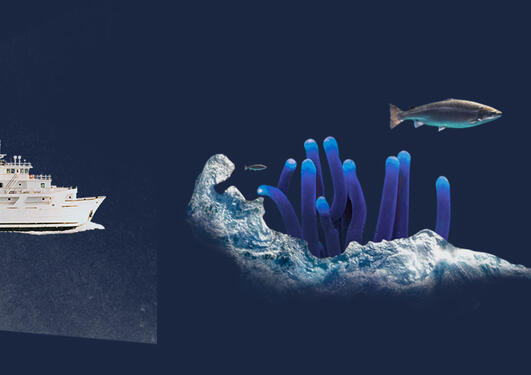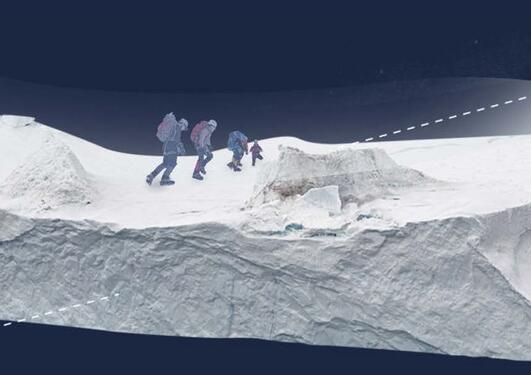Research possibilities for the SEAS postdoctoral research fellow in marine aspects related to human health
The information on this page is a supplement to the complete advertisement of the position in the recruitment-portal Jobbnorge. The full advertisement of this position in Jobbnorge will be available after august 1, and linked from this webpage. Call deadline is October 31, 2021.
Main content
Position | SEAS postdoctoral research fellow at the Faculty of Medicine |
Research area | Marine aspects related to human health (3 thematic areas available) |
Available supervisors | Professors Jutta Dierkes (Microplastic research), Lars Herfindal (Hyperbaric pharmacology and toxicology) and Hans-Peter Marti (Effects of fish residual raw materials in (possibly patient-derived) human kidney-on-chips) |
Mobility | For an incoming or outgoing candidate |
Unit of employment | Department of clinical medicine or Department of Clinical Science at University of Bergen |
Group affiliation(s) | Depending on project |
Thematic areas and supervisors
This position will be connected to one of the following thematic areas and supervisors:
- Microplastic research
Supervisor: Professor Jutta Dierkes, Department of Clinical Medicine - Hyperbaric pharmacology and toxicology
Supervisor: Professor Lars Herfindal, Department of Clinical Science - Effects of fish residual raw materials in (possibly patient-derived) human kidney-on-chips
Supervisor: Professor Hans-Peter Marti, Department of Clinical Medicine.
The position is open to either an incoming or an outgoing candidate, see mobility rules. Information about the supervisors and research possibilities for the fellow is available below. For further details about the research possibilities please contact the relevant supervisor(s).
Research possibilities and resources: Microplastic research (Jutta Dierkes)
A successful candidate will be included in The Centre for Nutrition at UiB.
The Centre for Nutrition belongs to the Department of Clinical Medicine at UiB. The Centre is directed by Prof. Gülen Arslan Lied, who is a gastroenterologist. The research project on ‘Health effects of microplastics is led by Prof. Jutta Dierkes, who is one of the senior scientists belonging to the Centre. We are collaborating with the Institute of Marine Research and the North Atlantic Microplastic Centre and with the research group in Environmental Toxicology at the Faculty of Science, UiB.
Research Interests
- Evaluation of the risks and benefits of fish and seafood consumption in clinical studies and in epidemiologic studies. The group has access to clinical research facilities and to a large study in nutrition epidemiology, the HUSK study (see here: https://husk-en.w.uib.no/ )
- Health effects of microplastic – we perform feeding studies in laboratory animals and investigate routes of uptake and biological effects of microplastic particles.
- Analysis of microplastic in both feed and feces of laboratory animals and from humans by use of advanced analytic facilities.
Competence
Our group members have extensive experience with key methodology required in the advertised project and beyond, such as clinical trials both in healthy volunteers and in patients, interventional animal studies and statistics, laboratory facilities for genetic, biochemical and functional analyses (incl. Ussing chamber, ELISA, qPCR), and imaging.
Ongoing scientific collaborations
- Tanja Kögel, Institute of Marine Research, Bergen, Microplastic analyses
- Anders Goksøyr, Dept. of Biosciences, Research group on environmental toxicology, UiB
- Marte Haave, NORCE, North Atlantic Microplastic Centre NAMC, Bergen
- Cornelia Weikert, German Federal Institute for Risk Assessment, Berlin, Germany
- Katrine Borgå, Dept of Biosciences, University of Oslo
- Silke Appel, Dept. of Clinical Science, UiB, head of the Flow cytometry core facility, UiB
Possible collaboration with other sectors
The Norwegian Food Authority (Mattilsynet), Nofima AS (Food and health research group), University of Tromsø (Tromsø study), Norwegian University of Science and Technology Trondheim (HUNT study),
We could well recruit a mentor from one of these institutions.
Infrastructure
Respective laboratory space including all necessary apparatus are available in our institution. Infrastructure is either located in the Laboratory Building at Haukeland University Hospital or in adjacent buildings (e.g., the Research Unit for health Surveys).
Funding
Financing of the group mainly by a grant of the Mohn foundation and by grants from the Horizon 2020 program (JPI HDHL) and by funding from the Health Trust Western Norway.
Co-supervisor from another faculty
Department of Biological Sciences
Research possibilities and resources: Hyperbaric pharmacology and toxicology (Lars Herfindal)
The research environment includes PIs from several scientific fields:
- Prof. Lars Herfindal and prof. Silje Skrede, Department of Clinical Science, University of Bergen
Pharmacology, pharmacological model systems, LC-MS/MS - Research prof. Rune Kleppe, Norwegian Centre for Maritime and Diving Medicine (NCMDM), Department of Occupational Medicine, Haukeland University Hospital.
Diving medicine, cell signaling, biochemistry - Prof. Anders Goksøyr/Assoc. Prof. Odd André Karlsen, Department of Biological Sciences (BIO), University of Bergen
Environmental toxicology, marine ecotoxicology, systems toxicology
Project focus
Within the thematic research area, the successful candidate will characterize how drugs and other xenobiotics are affected by hyperbaric conditions that mimic the marine environment. Particularly, we are interested in how these conditions affect pharmacodynamics and the biotransformation of drugs. The findings of the project will be relevant for understanding the impact of pressure and oxygen levels on xenobiotic responses in marine mammals and in humans. In the case of humans, this is relevant in relation to diving (in turn highly relevant in context of an increasing subsea activity level globally) and for hyperbaric oxygen treatment. The project will make use of different cell culture systems, tissue isolates and animal models (zebrafish, fish larvae, whales, and rodents or rodent tissues). When relevant, blood samples from human volunteers will be used. Different types of omics technologies are relevant for the project, in particular metabolomics, but also transcriptomics and proteomics. In addition, different functional outcomes and stress responses will be investigated.
Based on the pharmacological angle, LC-MS/MS methodology will be the cornerstone methodology. The ideal candidate should possess excellent LC-MS/MS skills and a thorough theoretical understanding of LC-MS/MS method development and applications. Experience with cell culture and cell biology is an advantage.
Relevant infrastructures for the project include:
- LC-MS/MS facilities at the Department of Clinical Science and BIO
- The hyperbaric cell laboratory at NCMDM has facilities where oxygen saturation and pressure can be controlled independently.
- Facilities for animal and cell culture experiments (including incubator for hypoxic conditions) on rat, mouse, whales (cell culture), and fish, tissue preparation at BIO, e.g., liver slice cultures.
- Platform for flow and mass cytometry.
Several relevant national infrastructures have facilities at UiB; National Consortium for Sequencing and Personalized Medicine (NorSeq), Norwegian NMR Platform (NNP), National network for Advanced Proteomics Infrastructure (NAPI).
Research possibilities and resources: Effects of fish residual raw materials in (possibly patient-derived) human kidney-on-chips (Hans-Peter Marti)
A successful candidate will be included in The Renal Research Group at UiB and Helse Bergen.
The Renal Research Group belongs to the Department of Clinical Medicine at UiB and to the Department of Medicine at Haukeland University Hospital with links to the Department of Biomedicine. We are also an associate group of the Centre for Molecular Medicine Norway (CMMN) at the University of Oslo (UiO). The Renal Research Group is directed by Prof. Hans-Peter Marti. Five other senior scientists belong to our group, such as Prof. Einar Svarstad, Associate Prof. Camilla Tøndel, Prof. Bjørn E. Vikse, Assistant Prof. Thomas Knoop, and Assoc. Prof. Sabine Leh from Norwegian Kidney Biopsy Registry (NKBR).
Research Interests
- Evaluation of fish products in (possibly patient derived) kidney-on-chips to study their effect on renal physiology and on chronic kidney diseases.
- Prognostic markers and novel therapy in human and experimental renal cell carcinoma.
- Definition of novel diagnostic/prognostic markers and therapeutic targets in hypertensive nephropathy and in IgA nephropathy and in other types of chronic kidney diseases.
- Zebrafish model of chronic kidney disease (Fabry nephropathy).
The core group directly led by Hans-Peter Marti currently consists of one postdoc, four PhD students, three technicians (two former postdoc fellows), and three ‘forskerlinje’ (research) students.
Competence
Our group members have extensive experience with key methodology required in the advertised project and beyond, such as statistics including bioinformatics, proteomics, mRNA/miRNA sequencing, interventional animal work, investigation of renal histology by stereology/automated image analyses, laser capture microdissection, basic biochemistry, and renal cell culturing. Latest kidney-on-chip technology from Emulate Inc., Boston, USA, are currently being introduced to the laboratory.
Connection with innovation
Development of a fish product screening program based on organ-on-chip technology.
Ongoing scientific collaborations
- Oddrun Anita Gudbrandsen, the Protein Group, Department of Clinical Medicine, UiB
- Naouel Gharbi, NORCE, Integrated Fish Biology
- Agnete S.T. Engelsen, Cancer Research, Biomedicine, UiB
- Marieke Kuijjer, Computational Biology and Systems Medicine Group, CMMN, UiO, Oslo
- Alexandre Hertig and Pierre Ronco, INSERM UMRS 1150, University of Paris VI, France
- Piotr Mydel, Department of Clinical Science, UiB, and the Jagiellonian University, Krakow, Poland
An incoming postdoctoral fellow would be welcome also for a shorter trial visit.
Possible collaboration with other sectors
Norwegian Food Safety Authority. Sars International Centre for Marine Molecular Biology. We could well recruit a mentor from one of these two institutions.
Infrastructure
Laboratory space including all necessary apparatus are available in our institution, such as the Renal Research Group and the Protein Group, at the University of Bergen. Infrastructure is located in the Laboratory Building at Haukeland University Hospital or in the adjacent Department of Biomedicine.
Funding
Financing of the group is mainly via Helse Vest (incl. three large open/strategic project grants 2017-2020, 2018-2021, 2020-2025), and four competitive international industry grants.
Co-supervisor from another faculty
Department of Biological Sciences, e.g., Fish Disease Research Group, Sustainable Fisheries Group.
See the full advertisement in Jobbnorge
The full advertisement in Jobbnorge will be available after august 1, 2021. Call deadline is October 31, 2021.

